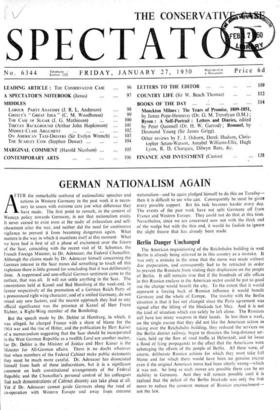Berlin Danger Unchanged
The American requisitioning of the Reichsbahn building in west Berlin is already being referred to in this country as a mistake. It was only a mistake in the sense that the move was made without due preparation, and consequently had to be retracted in order to prevent the Russians from visiting their displeasure on the people of Berlin. It still remains true that if the hundreds of idle offices in this Russian enclave in the American sector could be put to good use the change would benefit the city. To the extent that it would represent a forcing back of Russian influence it would benefit Germany and the whole of Europe. The trouble with the Berlin situation is that it has not changed since the Paris agreement was signed after the lifting of the blockade last May. And it is not the kind of situation which can safely be left alone. The Russians still have too many weapons in their hands. In less than a week, on the single excuse that they did not like the American action in taking over the Reichsbahn building, they reduced the services on the Berlin district railway, began to threaten the long-distance ser- vices, held up the flow of road traffic at Helmstedt, and let loose a flood of lying propaganda to the effect that the Americans were sabotaging the efforts of the people of Berlin. All these were, of course, deliberate Russian actions for which they must take full blame and for which there would have been no genuine excuse even if the original American move had been utterly wrong—which it was not. So long as such moves are possible there can be no stability in Germany. And they will remain possible until it is realised that the defeat of the Berlin blockade was only the first move to reduce the constant menace of Russian encroachment— not the last.










































